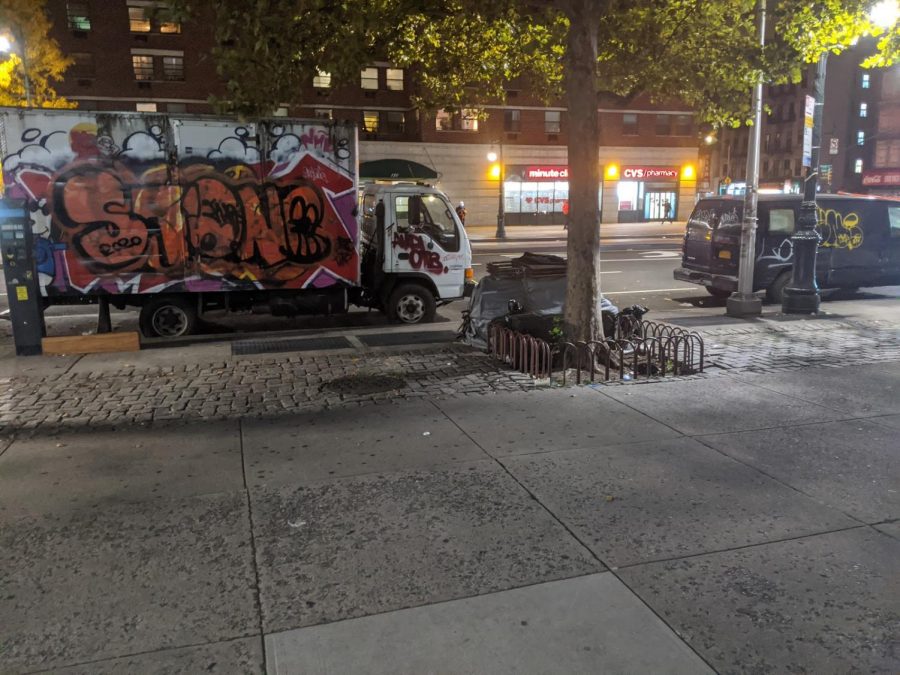The Effect of the COVID-19 Pandemic on the Economy
Temo Samson owns multiple fruit carts across Harlem. This includes the vacant fruit supply truck shown (on the left). Also shown is the empty space where one of his fruit carts used to be before it was packed away temporarily (to the center-right, around the front of the tree). “This was my source of income, and now it’s essentially gone,” said Samson.
On top of the now 245,000+ deaths in the U.S., the COVID-19 pandemic has been catastrophic for the United States economy for much of the year 2020.
Since March 2020, the U.S. economy and by extension its job market have noticeably suffered. Over the last couple months, the Coronavirus pandemic has increased national unemployment to a very high 7.9%, as a large number of business closures and layoffs have made net job losses skyrocket (head to this link to learn about how the economy has been impacted since the start of the Coronavirus pandemic).
Because of these losses, the pandemic has ended the longest job growth streak in United States history, which began during the Obama administration and lasted for several years.
The Coronavirus pandemic has restricted income for both large corporations and for small family-owned businesses, and it has also restrained the production of goods, trading, and much more. “Obviously, many people have lost lots of work, and the workforce is a huge part of our economy. I’ve had to close my business, and I’ve lost my customers. This is seasonal work; my carts are only open from March to maybe November. We do good business only in the summer. We’ve been closed since last November 2019, and I’ve lost an entire year’s work,” said Temo Samson, who owns numerous fruit carts throughout Harlem. For Samson, the fruit carts were his source of income, and losing them because of this pandemic has been very difficult for him.
However, not just the American workforce has been affected. Many other components of the economy have also been disturbed, as each sector of the economy impacts the others.
“I was laid off, so the economic situation directly impacted me, and there’s a hiring freeze, so it’s harder to find another position. And one problem leads to another, like dominos. Even before I was laid off, I was working from home, so I’d stopped taking public and private transportation. I live in Queens, so my commute was long, and I bought breakfast and lunch from around work, so those places lost business. My mom and son live with me, and we’ve all had to cut back. My son is doing remote learning, so that’s saved me having to buy clothes and supplies, and I don’t shop often anymore, but now those stores are losing business and that’s making it harder to find jobs. It’s a mess,” said Cristina Ferin, who used to work as a Financial and Grants Assistant at Weill Cornell Medical College.
Even with this diminution of jobs, business, trading, and more, President Trump keeps his belief that the United States is “rounding the corner” regarding the Coronavirus pandemic, as he has said on record numerous times, including in the final 2020 U.S. presidential debate between him and Democratic nominee and now President Elect Joseph R. Biden Jr.
President Trump has assured Americans that they will have a vaccine soon. Until then, we have to learn to live with the virus since we cannot keep the country in this slow economic state for much longer.
With this eagerness, Trump has referenced the stock market multiple times as an indication for how the economy is getting better. However, many economists have pointed out that the stock market is not a true representation of the economy as a whole.
“I personally disagree with how our president is viewing the economy. He does seem to care a lot about jobs, but he might not be looking at very accurate statistics; we’ve had a large net loss of jobs since the start of this pandemic, and this kind of thinking isn’t good for America,” says Shad Talha ’23.
Many people think that stopping the spread of COVID-19 as soon as possible is the only way to get this country functioning the way it was pre-Coronavirus. This requires that people follow COVID-19 safety protocols, such as social distancing, wearing a mask, and avoiding groups of people indoors (the latest safety protocols, information on the Coronavirus in general, and much more can be found on the CDC website).
“The economy is represented by many things, but most importantly by the people who work to keep it moving. That is why the best way to fix things is by recovering from the Coronavirus pandemic. The government has to help, but we all have to do what we need to,” said Samson.
“The economy is represented by many things, but most importantly by the people who work to keep it moving. That is why the best way to fix things is by recovering from the Coronavirus pandemic. The government has to help, but we all have to do what we need to,” said Samson.
Adam Sultan is a Features Editor for 'The Science Survey.' Adam finds editing his colleagues' articles to be the most appealing aspect of doing journalistic...

